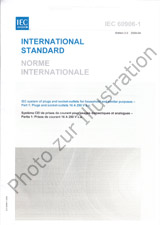Wir benötigen Ihre Einwilligung zur Verwendung der einzelnen Daten, damit Sie unter anderem Informationen zu Ihren Interessen einsehen können. Klicken Sie auf "OK", um Ihre Zustimmung zu erteilen.

IEC 62282-3-201-ed.2.1+Amd.1-CSV
Fuel cell technologies - Part 3-201: Stationary fuel cell power systems - Performance test methods for small fuel cell power systems
Name übersetzen
NORM herausgegeben am 3.2.2022
Informationen über die Norm:
Bezeichnung normen: IEC 62282-3-201-ed.2.1+Amd.1-CSV
Ausgabedatum normen: 3.2.2022
SKU: NS-1096038
Zahl der Seiten: 338
Gewicht ca.: 1045 g (2.30 Pfund)
Land: Internationale technische Norm
Kategorie: Technische Normen IEC
Kategorie - ähnliche Normen:
Die Annotation des Normtextes IEC 62282-3-201-ed.2.1+Amd.1-CSV :
IEC 62282-3-201:2017+A1:2022 provides test methods for the electrical, thermal and environmental performance of small stationary fuel cell power systems that meet the following criteria: - rated electric power output of less than 10 kW; - grid-connected/independent operation or stand-alone operation with single-phase AC output or 3-phase AC output not exceeding 1 000 V, or DC output not exceeding 1 500 V; - maximum allowable working pressure of less than 0,1 MPa (gauge) for the fuel and oxidant passages; - gaseous fuel (natural gas, liquefied petroleum gas, propane, butane, hydrogen, etc.) or liquid fuel (kerosene, methanol, etc.); - air as oxidant. This document describes type tests and their test methods only. This document covers fuel cell power systems whose primary purpose is the production of electric power. This new edition includes the following significant technical changes with respect to the previous edition: revision of test set-up, revision of measurement instruments, introduction of ramp-up test, introduction of rated operation cycle efficiency, introduction of electromagnetic compatibility (EMC) test, revision of exhaust gas test, introduction of typical durations of operation cycles. L’IEC 62282-3-201:2017+A1:2022 fournit des methodes dessai relatives aux performances electriques, thermiques et environnementales des petits systemes a piles a combustible stationnaires qui satisfont aux criteres suivants: - la puissance electrique de sortie assignee est inferieure a 10 kW; - fonctionnement raccorde au reseau/independant ou fonctionnement autonome avec une sortie en courant alternatif monophase ou une sortie en courant alternatif triphase ne depassant pas 1 000 V ou une sortie en courant continu ne depassant pas 1 500 V; - pression de fonctionnement admissible maximale inferieure a 0,1 MPa (G) pour les passages du combustible et de l’agent oxydant; - combustible gazeux (gaz naturel, gaz de petrole liquefie, propane, butane, hydrogene, etc.) ou combustible liquide (kerosene, methanol, etc.); - air comme agent oxydant. Le present document decrit uniquement les essais de type et leurs methodes d’essai. Le present document traite des systemes a piles a combustible dont le but principal est de produire du courant electrique. Cette nouvelle edition inclut les modifications techniques majeures suivantes par rapport a ledition precedente: revision du montage d’essai, revision des appareils de mesure, introduction de l’essai d’acceleration, introduction du rendement du cycle de fonctionnement assigne, introduction de l’essai de compatibilite electromagnetique (CEM), revision de l’essai de gaz d’echappement, introduction des durees types des cycles de fonctionnement.
Empfehlungen:
Aktualisierung der technischen Normen
Wollen Sie sich sicher sein, dass Sie nur die gültigen technischen Normen verwenden?
Wir bieten Ihnen eine Lösung, die Ihnen eine Monatsübersicht über die Aktualität der von Ihnen angewandten Normen sicher stellt.
Brauchen Sie mehr Informationen? Sehen Sie sich diese Seite an.



 Cookies
Cookies
